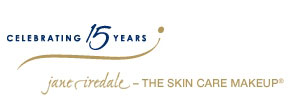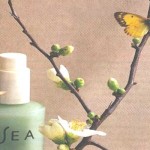 In the early 1990’s, film and television product Jane Iredale was increasingly disturbed by the damage chemical-based makeup was doing to her actresses, most of whom had little choice but to wear massive amounts of it on a daily basis. Despite having no background in cosmetics, Iredale set out to create a professional-quality base to replace the pore-suffocating foundations that were de rigueur in Hollywood. Her solution? A little known concept called mineral foundation. Despite the challenge of marketing a completely new concept (safe, healthy, mineral cosmetics), her ground-breaking brand was soon being sold all over the world, in high-end spas and salons, dermatology clinics, and even fitness centers.
In the early 1990’s, film and television product Jane Iredale was increasingly disturbed by the damage chemical-based makeup was doing to her actresses, most of whom had little choice but to wear massive amounts of it on a daily basis. Despite having no background in cosmetics, Iredale set out to create a professional-quality base to replace the pore-suffocating foundations that were de rigueur in Hollywood. Her solution? A little known concept called mineral foundation. Despite the challenge of marketing a completely new concept (safe, healthy, mineral cosmetics), her ground-breaking brand was soon being sold all over the world, in high-end spas and salons, dermatology clinics, and even fitness centers.
Although most ingredients in the Iredale line are natural, creating an eco-friendly cosmetics line was not – and still isn’t – her vision. “When I write out my goals, it is to have the best makeup line in the world, and that encompasses a number of things, from an ingredient point of view, to an encompassing aspect of all skin types, and then of course all aspects of color, whether it’s for television or an everyday natural look. We want to be as inclusive as we can, within the strictures we have set for ourselves for being as clean as possible.”
This radical approach to makeup has confused many consumers, who are used to their cosmetic options falling in to one of two groups: commercial (i.e., primary synthetic) or natural/organic. But Iredale is reluctant to place her line in either category. “We’ve always called this The Skin Care Makeup, because we’ve always seen it as a line that is good for the skin…and I think we agree that the more natural a line is, the better it is for the skin. But I tell my staff to avoid using the term ‘natural’ because we don’t really know how to define that.”
Iredale’s reluctance to define her cosmetics as natural has to do with her recognition that the term isn’t as black and white as many companies, PR firms, and consumers want to believe. “Even if I go outside and put mud on my face, it probably has acid rain or other chemicals in it. With minerals, you have to purify them in a lab. Is it natural to make iron oxides in laboratory conditions? No, but it makes them clean.”
Of course, this begs the question of what constitutes clean. “That’s a really hard question to answer,” replied Iredale when I posed the question, “because we all have things that are important to us. First, I work with my formulation chemists to make sure we are using ingredients that we do not believe have high toxicity effects. If I read a study that concerns me, like what I’ve read on parabens, or I know that some FD&C dyes are comodegenic or carcinogenic…it’s a very hard thing to grapple with. Right now, we’re going through this nano-tech investigation. Nobody knows whether it’s good, bad or indifferent. People are using scare tactics, but there is no clear evidence either way. So what do I decide to do?”
Iredale’s approach to safety is not based solely on her own opinions or conscience. She was, in fact, one of the original supporters of the Skin Deep Database, and has made changes to several of her top-selling products to ensure her products continue to receive low hazard ratings. Not all changes, however, were based on her belief that the ingredients she was using were hazardous. In fact, Iredale agrees with the increasingly loud chorus of natural beauty product experts who are concerned with high hazard ratings given to certain ingredients.
“An issue I have with Skin Deep,” Iredale states emphatically, “is that they pay no attention at all to the percentages. How much of something does it take to be harmful to you and the environment? I’m aware that it’s the accumulative effect that makes the difference, but there has to be a point where we take into consideration the amount in a product before we rate it a 7 because it’s got .001 of [some chemical]. The gold in our shimmer powders, we use food-grade gold flakes. It kills me that it gets a 7. I’ve discussed this with them, and they tell me it’s a 7 because it’s not an ‘approved colorant.’ So I’ve had people return the product because of that, and that is what makes people [like me] tear their hair out.”
Even though Iredale knew the food-grade gold was safe for use, she decided to change it, although not without some frustration. Still, her anger isn’t with the Environmental Working Group, as she believes the problem lies more with the scope of the project and the limited resources they have to accomplish their objectives.
“With the best intentions of the world, [Skin Deep] has set for themselves an impossible task. Many manufacturers won’t get them the percentages.” She goes on to point out that much of the research on which they are basing their conclusions is scarce, dated, and often inapplicable to cosmetics. “What happens with Skin Deep is that everything gets tarred with the same feather and the consumer ends up being scared and at best confused.”
Given the flaws in the Skin Deep database, Iredale advises using it as part of a more holistic examination of the brand in question. “The important point is for the consumer to try and understand the ethics of the company, and they do that from amassing a whole load of information about it. Is the company transparent, can you easily find the ingredients. The people running the company, what are their values, do you think they have integrity? Then it’s not just a question of this or that ingredient.”
It becomes clear, after discussing the complexities of makeup, ingredients, and safety with her, that Jane Iredale approaches her work with a level of reflection, research and flexibility that one rarely sees in the beauty industry. While many brands are still struggling to define themselves and their standards, Iredale seems comfortable knowing that the ground is always shifting as new research emerges, customer demands change, and new green technologies are discovered. Through it all, she remains steadfast in her commitment to maintaining an honest balance between safety and glamour. A true pioneer, Iredale continues to lead the charge in finding non-toxic, high-performing cosmetics, and will no doubt remain at the forefront of the industry for years to come.


4 Comments